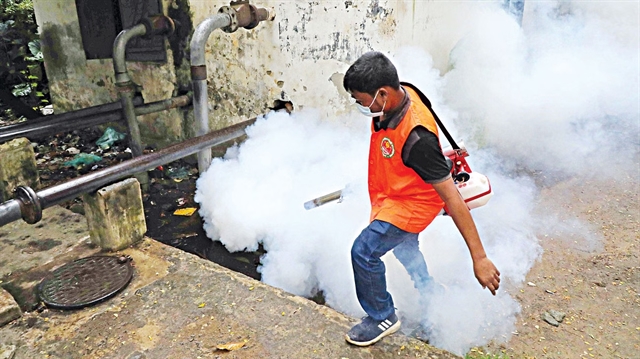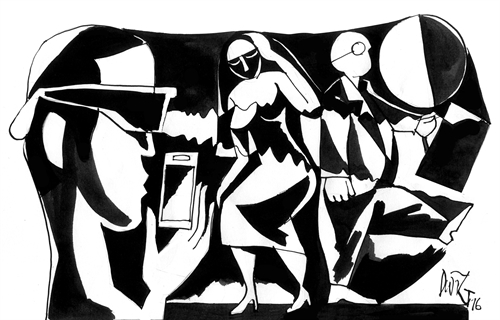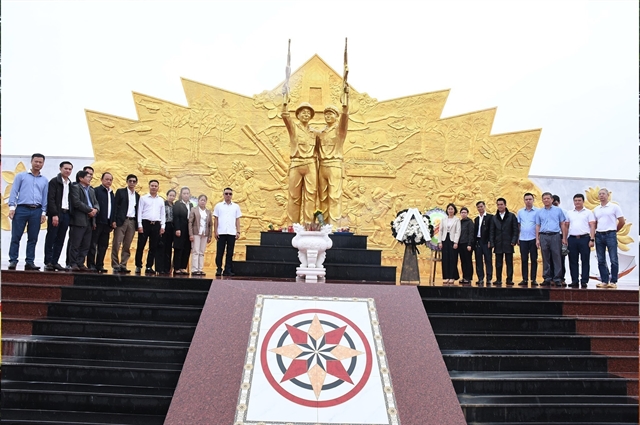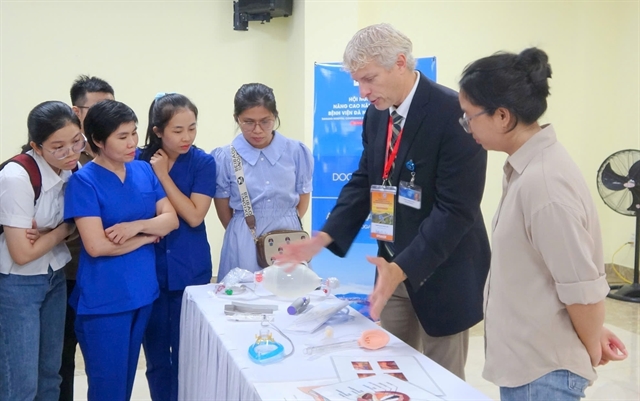

This is the “software to measure truth”, integrated in a mobile phone that can record sounds and images, run by the operating system Ohhmimich, invented by a computer student named Tỵ.
 |
by Phùng Hi
This is the “software to measure truth”, integrated in a mobile phone that can record sounds and images, run by the operating system Ohhmimich, invented by a computer student named Tỵ.
All aspects of the software were discovered by Tỵ himself - not by a group of people. Tỵ studied information technology in a non-profit university. Sometimes, a dream rose up inside Tỵ of becoming a Bill Gates, even while sleeping in the tight quarters of a dormitory owned by a widow, a native of Nghệ An.
Tỵ’s parents were farmers who had toiled in the field for years. To help Tỵ’s studies, his parents had to sell their cows and pigs, or borrowed money from the local credit institution in hopes that their son would become a great talent one day.
Having finished his study, Tỵ went back to his home village, working with his laptop around the clock while waiting for a job to do. At the end of the day, he had invented software billed as the “software to measure truth”.
The truth-measuring software will become as essential as rice and water in a world saturated with falsities and deceptions. With this software, Tỵ could sell it and earn billions of đồng and his parents would become the richest in the area. Why did he invent this software? What was his ambition for it? Such a lanky guy had never said “hello” to the villagers, and he was thought to be an oddball.
The first year, Tỵ was successful in measuring the authenticity of organic vegetables and chemical-free meat to see if the products’ claims were accurate. When he placed his mobile phone close to the object that needed measuring, the percentage of authenticity of the item appeared on the screen. So, a truth metre for food safety is necessary.
The second year, Tỵ added another component that measured the truthfulness of advertised products. A shampoo brand claimed it allowed the user to have super smooth hair the whole day. When he put his mobile phone close to measure the truth, the screen showed that the shampoo’s smoothness was only 15%. In general, every advertised item had 50% truthfulness or lower. Even some health goods, like dietary supplements with sky-high prices, were 0% truthful.
Tỵ began to take his software to canvass communications firms with a selling price of two billion dong. The bosses of these firms just shook their heads:
“The consumers are quite familiar with advertisements,” one said. “They make a decision to buy something when they find it useful and, you know, the images on advertisements are very appealing!”
Another person said:
“On the contrary, advertisements have damaged the image of products because of their stupid pictures and words.”
‘Would all my hard work be in vain?’ Tỵ wondered. ‘Or would I have to add software that could measure the truth of words from officials and politicians on television?’
After coming up with the concept, Tỵ became absorbed in working on this new component. He had to work in stuffy heat with mosquitoes biting all around.
Tỵ was jobless for the third year. He had become poor and lacked food to eat. One day, when a local official said, ‘We are determined to fix the bad traffic conditions in the first quarter’, Tỵ quickly placed the mobile phone closer, but it went off immediately.
After adjusting the software, it revealed that what the official said was not true. But the phone did not work anymore. He had to buy another secondhand phone.
This time another official spoke:
“I will resign if things are not resolved before the election of the People’s Council.”
Tỵ again pushed his phone closer to find out if the official’s words were true. But the phone glitched again. It showed that the statement was truthful, but only because the official would not resign; he would be put in prison.
This showed that the more eloquent officials were, the more damaged the phones became. The phone received and processed all the false words. And false words were heard everywhere - in the voice of someone singing, or even in a caged bird’s song.
The software had three functions: to measure the safety of food, the accuracy of advertisements and the truthfulness of human words. Tỵ again brought his product to offer to a communications firm. The general director of the firm said:
“Even if you gave it to me for free, I would not have the guts to take it. Measuring the truth of words? I don’t want to rot in jail!”
Tỵ looked dejected for weeks. His website, thetruthgauge.com, had a button on the left corner of the screen, allowing customers to pay USD$50 for a one-month subscription. At first he thought it was just for fun. But to his great surprise, there were a dozen downloaders a day. It was strange enough that the people from rich and civilized countries liked this software, while not a single Vietnamese soul visited his site. But then again, how could fish living in troubled water know the water is troubled? Formerly a jobless guy, Tỵ was now able to earn a million dong a day.
The cosmetics, soaps and food producing firms hired super hackers to destroy thetruthgauge.com, but they all ended in vain. In Tỵ’s eyes, they were just a bunch of mischievous children.
Tỵ’s daily revenue climbed even higher. On Valentine’s Day, there were about 2,000 downloaders who wanted to know the truthfulness of the loving words they received. Yet, Tỵ came under fire from critics who hated the fact that he made such a huge sum of money each day without making any investments, keeping books, tracking transactions, or hiring assistants. His parents found it hard to conceptualise the amount of money he earned; it amounted to ten billion dong. But a corrupt official could ‘glean’ a trillion dong from the public fund. So these people were the ones who were truly number blind.
When the Chinese began paying attention to this software, all the big Japanese producers found that their sales had continuously declined. People no longer watched television. There was no truth in the news or films. Even weather forecasts were not true, so what was the use of buying a television set? An unpredictable consequence! If only half of China’s population did not watch television, all the electronics companies were in danger of taking to their heels. It seemed that the entire world lived in China.
All the television production companies met. They did research on Tỵ’s revenue and character, and then they sent their representatives to Viet Nam and negotiated with him that if he pulled his truth gauge from the internet, he would be paid USD$5 million. Tỵ agreed with the contract.
His village was a poor village. Yet, after three years it had a 26-year-old millionaire. His small house was now furnished with the most expensive things. The media now praised him to the skies. However, there were also many envious people who hoped to manufacture a super machine that would gauge the truth better than Tỵ’s software.
A rich man needs no other special qualities to marry a diva or Miss Universe. But for Tỵ, all girls, from unrefined ones to models, were all afraid of him. Why? It was quite simple: these girls were afraid of having their true identity exposed by his truth gauge. Living without confidence was like living in hell. All their masks would be laid bare; all falsities would be revealed. Sometimes, some girls were bold enough to keep in contact with him; but only 50% of their actions and words were discovered to be true. Particularly, the false parts on their bodies were exposed. Tỵ could not marry such a girl, he thought.
But his mother said one day:
“I don’t need money. What I want now is to have a grandchild!”
What a nuisance for Tỵ! ‘So money was not everything, was it?’ he wondered.
However, Tỵ thought he would marry the most beautiful girl in the area just to spite those who had envied him, saying that he was not intelligent enough, or that he would go mad one day after facing so many lies.
‘No, I am the richest man in the area. So why don’t I organize the most ceremonious wedding to make these people die of envy?’ Tỵ thought.
Translated by Mạnh Chương









